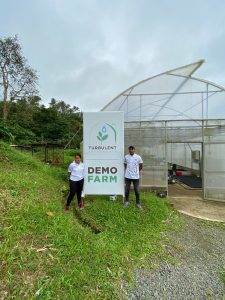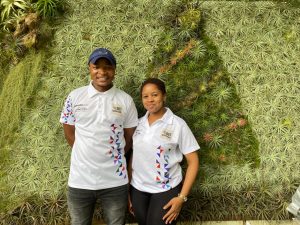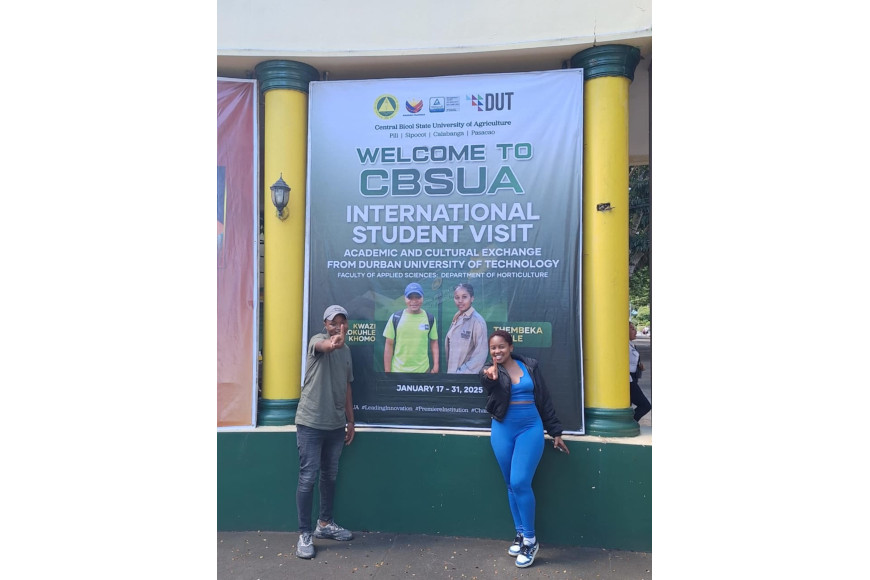Two Durban University of Technology (DUT) Horticulture students, Mr Kwazi Khomo and Miss Thembeka Josephinah Mbele, recently had the exceptional opportunity to enhance their horticultural expertise at the Central Bicol State University of Agriculture (CBSUA) in the Philippines.
The two outstanding DUT students were integrated in the Horticulture academic programme at CBSUA’s College of Agriculture and Natural Resources through the Student Interactive-Experiential Learning Programme (SIELP). The SIELP is an educational initiative that integrates interactive, collaborative, and experiential learning methodologies. The aim of the programme is to enhance student engagement, and develop essential practical skills that are pivotal for both academic and professional success. The students gained hands-on exposure in plant propagation, landscaping, greenhouse management, and post-harvest handling of horticultural plants. They were introduced to sustainable practices, including stingless beekeeping, organic agriculture production, farm tourism, and diversified farming systems, all of which play a crucial role in sustainable horticultural production.The curriculum offered a comprehensive blend of theoretical instruction and field-based learning experiences, enabling students to develop competences in core horticulture areas.
Giving insight into their exhilarating, ‘green fingers’ journey was Professor Mack Moyo, Head of Department at the Durban University of Technology’s (DUT’s) Horticulture Department.
He shared that the students were hosted at CBSUA Pili Campus by Professor Edlynne Kaith R Manlangit, Dean of the College of Agriculture and Natural Resources.
“Our students were integrated in the academic programme, specifically in the areas of horticulture and crops technology,” he explained.
He indicated that they also had the opportunity to engage in cultural activities and shared experiences with the CBSUA community, which deepened their understanding of Filipino culture and traditions.
Professor Moyo emphasised that the student exchange experience has helped to broaden their perspectives on international academic practices and enhanced their cross-cultural communication skills and global awareness. “This visit aligns with DUT’s internationalisation initiative, which is aimed at fostering cross-cultural academic exchanges and providing our students the opportunity to engage with global peers and academics. This international experience is designed to broaden their knowledge, enhance their skills, and provide a global perspective,” he said.
One of the excited recipients of the programme was Kwazi Khomo, a fourth-year student studying towards his Advanced Diploma in Sustainable Horticulture at DUT. The fervent 24-year-old is passionate about horticulture, landscaping, sustainable farming, and waste management practices.
“I was recommended for this programme due to my hard work and passion for horticulture and landscaping. This opportunity followed my work-integrated learning experience with the eThekwini Municipality Parks, Leisure, and Cemeteries, where I was awarded composting training at the Durban Zero-Waste Composting Project,” he said.
This was the first time he had travelled overseas, and conveyed his excitement upon his arrival at his destination.
“The students, faculties, and the entire CBSUA community were welcoming and offered us excellent hospitality. During my two-week stay, I studied various aspects of horticulture and landscaping, including soil science, vermicomposting, dish garden construction, entomology, and propagation of perishable ornamental plants,” he shared.
For Khomo, he aimed to gain knowledge and skills in sustainable farming practices, micro-propagation, and zero-waste practices.
“I achieved these objectives and acquired new skills, including stingless bee farming and agritourism. I believe that international opportunities like this are vital for DUT students, as they provide a platform for networking and to explore sustainable farming practices and cultural experiences in other countries,” he said.
Khomo relayed that the trip to CBSUA was an enriching experience that broadened his knowledge and skills in horticulture and landscaping. “I am grateful for the opportunity and look forward to applying my new skills in my future endeavours,” he said.
Thembeka Mbele, was the other exceptional student who paved her way to CBSUA for the dynamic experience. Mbele is currently doing her third year for her Diploma in Sustainable Horticulture and Landscaping which is under the Faculty of Applied Sciences.
“For this student exchange programme between the two universities, Mbele was recommended by her lecturer and Head of Department.
“This was my first time traveling overseas and I was very excited about traveling, I watched a few videos online to see how the system works at the airport. I was also a bit scared since we were flying for long hours and were very far away from our usual space. However, once we arrived in the Philippines I was beyond excited and I was ready to explore and learn,” she said ecstatically.
 Mbele reiterated that at CBSUA they had studied a lot of what is related to their qualification and on agriculture. “We took classes on agricultural technology, soil science, agri-tourism , horticultural plant art, organic agriculture, different machinery used in agriculture, stingless bees and what they produce. We also performed tissue culture in one of the school laboratory; and visited a few of the farms in Phili, Butangas and Sorsagon. We learnt about the Philippine culture, their staple food and traditional attire,” she said.
Mbele reiterated that at CBSUA they had studied a lot of what is related to their qualification and on agriculture. “We took classes on agricultural technology, soil science, agri-tourism , horticultural plant art, organic agriculture, different machinery used in agriculture, stingless bees and what they produce. We also performed tissue culture in one of the school laboratory; and visited a few of the farms in Phili, Butangas and Sorsagon. We learnt about the Philippine culture, their staple food and traditional attire,” she said.
For Mbele, getting to see what is happening around the world, how people are dealing with global issues and what is common between countries is what fascinated her.
In terms of the food and culture, Mbele happily shared that the Philippines cuisine like their famous halo halo dessert, their taro stew, a leafy vegetable, is what she had enjoyed.
Professor Moyo further shared that the student exchange programme aligns with the institution’s mission to deliver innovative curricula and research, and offer a distinctive education. “The experience develops adaptable graduates by enhancing their critical thinking and cross-cultural competencies, equipping them to thrive in a dynamic knowledge economy. The two-week international exchange in the Philippines provided our students with valuable knowledge and skills while broadening their global outlook through academic and cultural engagements,” he said.
Pictured: Kwazi Khomo and Thembeka Josephinah Mbele.
Waheeda Peters

